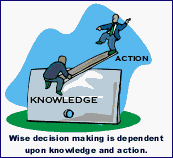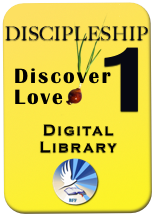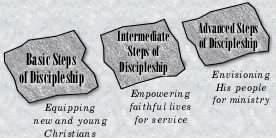
Good Decision-Making and Knowledge – Study Guide
Paul J.Bucknell

This is part 2 of the 'Good Decision-making' series
Good Decision Making and Knowledge
Good Decision Making and Action
Good Decision Making - study guide
Good decision-making is dependent on two essential components: knowledge and action. There are, undoubtedly, many other important aspects to making wise decisions. However, possessing the right knowledge and having the determination to follow up with the right action are essential to this process.
This article largely discusses the knowledge that we need to make right and good decisions. The place for determination or action in decision-making will be discussed briefly at the end. We will first focus on how what we know'our knowledge' affects wise decision-making.
Later, the importance of following up this knowledge with action will be discussed. Many have the right knowledge but using that knowledge is part of making wise decisions. For example, there is a plethora of knowledge about condoms and STDs. However, not many people use that knowledge in making decisions.
Remember that knowledge is only part of wise decision-making. The other part is shaping one's decision by that knowledge that they have. We could believe that this is due to the lack of the right knowledge. If they really knew the ramifications of their decisions, we assume, they would not make such decisions. But this is not real to true life. There are other factors such as wanting and doing what we know is right. Let us focus on three Biblical instructions that shed light on this issue.
1) Knowledge alone is inadequate.
Like a dog that returns to its vomit is a fool who repeats his folly (Proverbs 26:11).
This proverb clearly gives us a picture that we will commonly see today. A husband who beat his wife again last night goes out to the beer joint. The wife who argued with her husband, only to find them more distant again, argues with him as he comes home. The person who gets a bit deeper and deeper into debt every time he gambles, again borrows a little money from a friend and frequents the casino.
The term addictive behavior has become quite popular. It is used to describe people who, though they have knowledge of the harm that comes their way from previous experience, again and again return to the same situation, only exacerbating those around them. They are like the dog that returns to the vomit. They have experiential knowledge but they can't or are unwilling to apply it to their lives.
2) Knowledge needs the company of discipline.
"He will die for lack of instruction" (NASB: Proverbs 5:23).
"He will die for lack of discipline" (NIV: Proverbs 5:23).
Although this verse seems to state that a person will die because of the lack of knowledge, the verse really says the opposite. They have knowledge but they do not have the 'instruction' or 'discipline' that is required to implement the use of knowledge into their lives.
These are the people who think that life should not be limited by laws and constraints. Perhaps they have learned this through studying Rousseau in a philosophy class but more often than not it is learned from the way they watched their parents spurn the law. They never learned to respect instruction from others. The opposite is true: they have learned to despise it. They actually think they are 'beating the system.'
This verse states clearly the consequence of rejecting knowledge. They will die. Whether it is my neighbor who refuses to stop smoking and knows that he will die because of it or another who is destroying his marriage by pornography. They are unwilling to bridle their behavior.
This is the fool. He knows what he should do but because of the lack of training, he despises that knowledge and lives by his own desires. He even makes these decisions when it hurts himself and others. The word 'instruction' is sometimes translated as discipline or chastening. Again, we clearly see that knowledge in and of itself is inadequate to help people.
Seeking God's will or your own?
![]()
Discipline or instruction is learned early on in life. The child learns that there are negative consequences for knowing what he ought but refusing to do it. If he or she is consistently disciplined, then the child will allow the knowledge to influence their decisions. If they are not disciplined, the child will learn to ignore the help of knowledge at key times.
This is, perhaps, one basic problem of the lack of time management. They cannot get around to regulate their time as they ought. They know what they ought to do but just can't get around to do it whether it is because of reading a newspaper or watching a television program.
The child learns to reject the knowledge of others including God. He has knowledge but never learns to compel himself to listen to that knowledge. "He will die for lack of instruction." You can read more of this in the Biblical Principles of Parenting series.
3) Knowledge and Obedience
Notice what the wise elderly John wrote regarding the blessing of reading the Book of Revelation,
"Blessed is he who reads and those who hear the words of the prophecy, and heed the things which are written in it; for the time is near" (Rev 1:3).
Study Guide
The answers to the following questions can be found in the part 1 and 2 of the 'Good Decision-making and Knowledge' series.
(1) Good Decision-making and Knowledge
(2) Good Decision-making and Action
1. Name the two essential elements to making wise decisions? Why are they both important? Are there other things that are also essential to making the best decisions possible?
2. What are the three areas of knowledge that are mentioned in this article? Are there other areas?
3. Define experiential knowledge. How has your own knowledge been shaped over the years? Where is your personal knowledge considered weak? Strong?
4. Why are the chief limits of relying solely on experiential knowledge to make the best decisions?
5. Why does modernism so strongly focus on experiential knowledge?
6. How much study of the past have you involved yourself in? Again, what are your strong and weak areas? Do they help you in your decision-making? How so?
7. What are the limits of historical knowledge?
8. Name one example that revisionism has negatively affected or tried to influence you in your life decisions.
9. Define spiritual knowledge.
10. Where does spiritual knowledge come from?
11. Is spiritual knowledge common or rare? Easy to find or hard to discover?
12. How much spiritual knowledge do you rely upon in your decision-making? Please give an example.
13. Can one rely too much on spiritual knowledge? If so, explain?
14. Write in your own words why 'Action' is as important as 'Knowledge' in making decisions.
15. Explain Proverbs 26:11 through modern illustrations and language.
16. How is discipline related to 'Action?'
17. Why does anyone need to be admonished to 'take heed' to do the things written (see Rev. 1:3)? Do we regularly know the right thing to do but do not take consistent action?
18. Summarize how all three areas of knowledge are to interrelate to each other so that we can make best life decisions possible.
19. Reflect upon your own life and find one or two areas that you have knowledge but do not consistently apply it to your own life. Why is it important to be consistently carrying out those things? Write out a plan on how you will by tomorrow begin consistently make wise decisions in that one or two areas.
More Basic Discipleship materials
 If you would like, you can order the BFF Discipleship #1 Training Library which has many helpful discipleship resources including this series.
If you would like, you can order the BFF Discipleship #1 Training Library which has many helpful discipleship resources including this series.
These materials can be read, printed out and used at your convenience. A more complete description is at the BFF Resource Center.
BFF Basic Christian discipleship materials

BFF has three sets of basic discipleship materials with slightly different objectives.
3 X E: Trains new or untaught believers basic teaching to ground them in their faith and integrate them into the church. ...More
Cross Trainers: Many new believers do not understand how to have good relationships with others. Cross Trainers uses biblical models to help struggling believers have great relationships with God and others. ...More
Life Lessons: Many believers do not know how to teach or disciple new or young believers. Life Lessons shows how to train new believers through short videos and handouts. ...More









